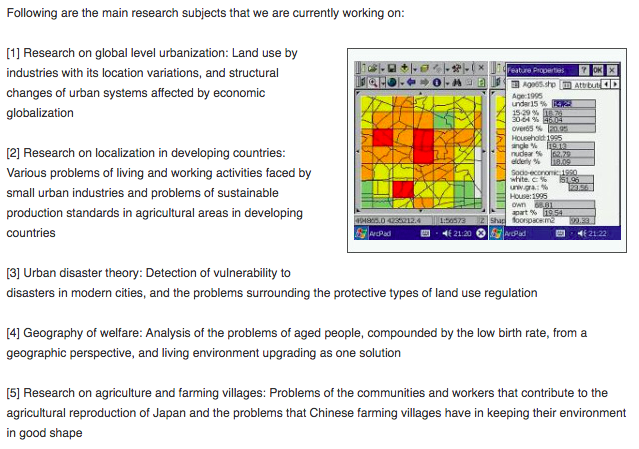Human Geography in Japan
What does human geography look like in Japan? How does it converse and
converge with ideas in the UK?
In the UK, the discipline is ever unfolding and emerging with greater complexity. Its most recent appendages include aural, emotional, material, non-representational and media geographies. With great attention at UCL and in academic journals, ‘the relationship between the human and the non-human has come under scrutiny’ (Cloke et al., 2004: 5).
In Japan, the field of Human Geography isn't as rich
or expansive. At Waseda, I am placed within the School of International Liberal
Studies and am using this multi-disciplined approach in geography to find
suitable modules. Human Geography is offered as one course in both The
Facility of Political Economy and The School of Education. In this module, the
focus is on regional, population and economic theory. There is a cross over
with urban and economic geography courses at UCL which introduces thinkers such
as Richard Florida, Milton Friedman and Manuel Castells, alongside ideas of
activation policy, post growth societies and NIMBYism. Looking to other
institutes to find a greater synthesis of geographical thought, I
researched several universities, professors, societies and research groups
in both English and Japanese to understand the breadth and depth of the
discipline.
The Japanese Journal of Human Geography under The Human Geographical Society of Japan has recently featured
articles on regional development, immigration and epidemics. University courses in Japan appear more connected with the empirical and the positivist movement of geography, focused on regionalism, spatial design and data acquisition whereby ‘spatial patterns can reflect social structures and [how] spatial processes can be used as an index of social relations’ (Cloke et al., 2004: 4).
At Tohoku University, the Human
Geography research group has focused on 5 subsections: agriculture,
welfare, disaster, urbanisation and localisation. In the UK, there isn't emphasis on agriculture policy and practice, despite its integral link to
the earth’s surface, to geographies of food, environmental management and
farming policy.
 |
| University of Tokyo Department of Human Geography Information |
The study of Human Geography in the UK is both broad and specific. It is broad in how it encompasses many sub disciplines such as economics, cultural studies, politics, anthropology, sociology, history and development studies. Its specificity is in its focus on a spatial enquiry that can often abstract and critique it’s mother discipline. To speak broadly, Geopolitics or Political Geography as an example focuses more on how political actors spatialise power (Ó Tuathail and Agnew, 1992) whereas Politics focuses on how political actor systematise power.
One disappointing feature of my time at Waseda is not having access to the works of Japanese scholars. Most of my professors are International and classes with Japanese professors often utilise Western academia. In the UK, as a result of language barriers, the discipline has a greater dialogue with America and Europe which perpetuates the limited academic dialogue we are able to have globally.
References:
Cloke, P., Crang, P., & Goodwin,
M. (Eds.). (2005). Introducing Human Geographies. Routledge.
Ó Tuathail, G., and Agnew, J. (1992)
Geopolitics and Discourse: Practical Geopolitical Reasoning in American
Foreign Policy. Political Geography, 11, 2: 190–204.
Tohoku University Research Group
http://www.es.tohoku.ac.jp/EN/research_group/ges05.html
The University of Tokyo, List of Departments
Waseda Human Geography Syllabus

Comments
Post a Comment